![[Survey of mothers suffering from postpartum hair loss] 81.6% of mothers have experienced suffering from postpartum hair loss and thinning!](/news/news_20231130/%E7%94%BB%E5%83%8F1_r2.png)
Mothers who exhibit a strong motivation to rejoin the workforce perceive postpartum hair loss as a hinderance to women's success. Over half of postpartum mothers sought advice from their spouses or partners regarding their hair concerns.Additionally, there is a noteworthy high rate of partner involvement in childcare, revealing a familial landscape in the Reiwa era (2019-present) where households collaborate in addressing the challenges of postpartum hair loss.
To harness the capabilities of ultrasound technology for mothers struggling with hair challenges, we are holding a limited event, "Beauty salon to nurture mom's future," to support mothers postpartum hair loss!
As a part of its initiative to introduce the capabilities of ultrasonic care globally, SonoRepro™, a brand specializing in ultrasonic scalp care devices offered by Pixie Dust Technologies Inc. (Head Office: Chuo-ku, Tokyo; Representative Directors: Yoichi Ochiai and Taiichiro Murakami; hereinafter "PxDT"), dedicated to addressing societal issues through technology rooted in academia, will hold a limited-time event "Beauty Salon to Nurture Moms' Future" from Friday, December 15, 2023. The event aims to empower women struggling with postpartum hair loss to facilitate their return to society. Ahead of this event, we conducted a survey involving 900 women who have experienced postpartum hair loss/thinning, and gathered insights from mothers navigating the challenges of postpartum hair loss.
Survey findings revealed that 81.6% of women experienced postpartum hair loss or thinning in their most recent birth, identifying themselves as "postpartum hair loss sufferers" experiencing psychological distress without a clear strategy to address it. In terms of awareness and perspectives on postpartum hair loss, the top three sentiments were: "I desire easy home care solutions," "I wish for increased understanding from others," and "I want my partner to provide support". This feedback underscores a significant need amongst postpartum mothers for practical solutions, home care methods, and understanding from their families and social circles.
On the other hand, more than half (51.4%) individuals who experienced postpartum hair loss have consulted with their "spouse / partner (hereinafter referred to as partner)" about their concerns. Simultaneously, a significant 83.8% received childcare support from their partners. This sheds a light on the "portrait of families in the Reiwa era," characterized by open communication among family members, shared concerns, and collaborative support from a partner actively involved in parenting. In addition, those who receive childcare support from their partners exhibit minimal impact on their behavior and psychological well-being in response to postpartum hair loss, indicating a lower level of anxiety associated with this condition. Furthermore, individuals expressing higher motivation to reenter the workforce post-birth identified postpartum hair loss as a potential "barrier to women's success" (42.4%), hinting at a potential correlation between decreased work motivation and performance post-maternity leave and the experience of postpartum hair loss.
We aspire for PxDT to stand in solidarity with women facing postpartum hair loss, enabling their fulfilment in both their professional and personal lives while actively participating in society through the demands of raising children. Furthermore, under the "SonoRepro" brand, we are committed to extending the reach of PxDT's ultrasonic care, amplifying the joy of living with enhanced self-confidence.
Survey summary
Among women who have undergone childbirth, 81.6% have faced postpartum hair loss and thinning. While 70.6% of those who had experienced postpartum hair loss expressed concerns, 70.1% also indicated that they "didn't/couldn't take any action" regarding measures and care. This highlights the reality of anxious, postpartum mothers unable to address their concerns.
■Regarding the concerns with postpartum hair loss, 26.8% of respondents answered that they "didn't consult anyone/couldn't," revealing that one in four individuals is grappling with worries about postpartum hair loss independently.
■The top three perspectives around post hair loss were: "I desire easy home care solutions (73.1%)", "I wish for increased understanding from others (66.4%)", and "I want my partner to provide support to mothers facing postpartum hair loss and thinning (65.4%)". It became evident that many postpartum mothers feels uncertain about specific solutions or care methods for "lost postpartum hair" and need the understanding of their families and those around them as they grapple with feelings of anxiety.
■51.4% of individuals sought advice from their partner regarding postpartum hair loss, and a substantial 83.8% received childcare support from their partner. Furthermore, 41.5% of those who consulted their concerns with their partner stated that there was "no particular impact" on behavioral changes caused by postpartum hair loss. This underscores that effective communication and childcare cooperation within the household contributes to mitigating postpartum hair loss issues.
■Among those highly motivated to return to work after childbirth (30.9%), 42.4% expressed that postpartum hair loss poses a barrier to women's success, suggesting a potential connection between postpartum hair loss, the motivation to reenter society and workforce after maternity leave, and challenges in work performance.
Survey Overview
Survey period: October 20 (Fri) -October 28 (Sat), 2023
Pixie Dust Technologies, Inc.
Survey target: Women currently residing with a child under the age of 3 and suffers from postpartum hair loss and thinning / experiencing emotional distress
Number of valid responses: 900
Survey method: Internet survey
Survey results
■While over 80% of people experienced issues related to postpartum hair loss and thinning, more than 70% of respondents answered that they "didn't/couldn't do anything" as a countermeasure.
Among women who have undergone childbirth, 81.6% reported experiencing postpartum hair loss and thinning, for reasons such as "I don't know how long it will last (54.2%)", "I'm worried about the impact on my appearance (41.7%)", and "I don't know how to care for it (37.8%)". Notably, 70.6% of respondents felt anxiety about their own appearance and health, and loss of confidence, and over 70% stated they "did not do anything / could not take any measures (70.1%)", highlighting the current predicament of postpartum mothers who find themselves unable to find adequate care.
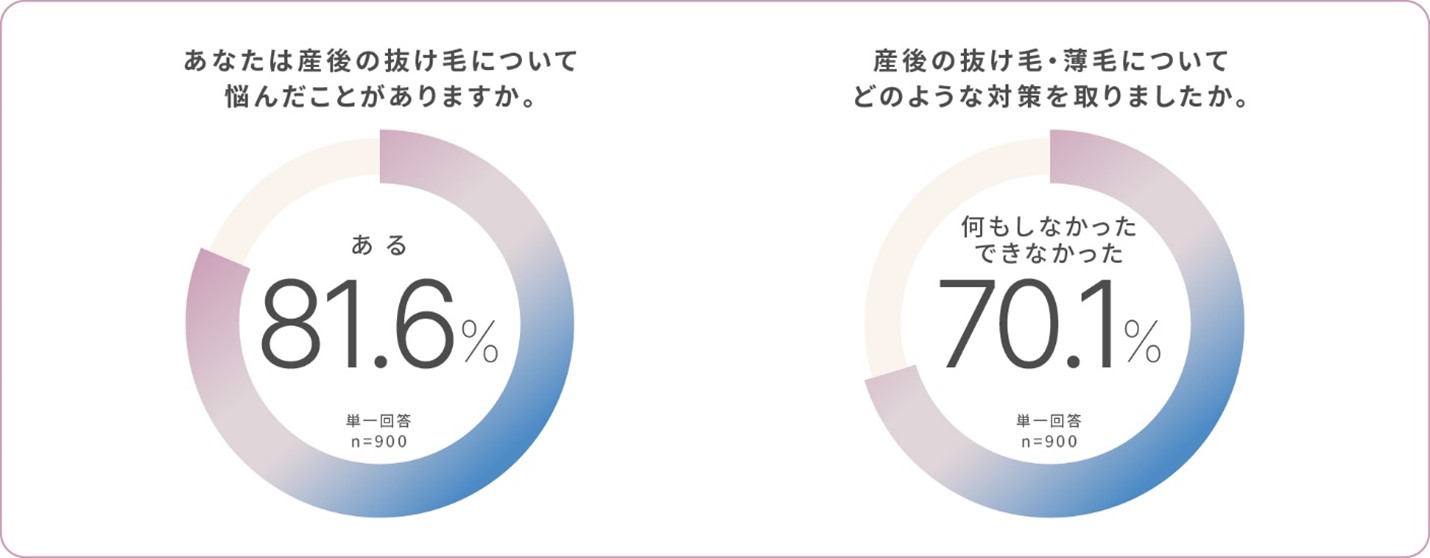
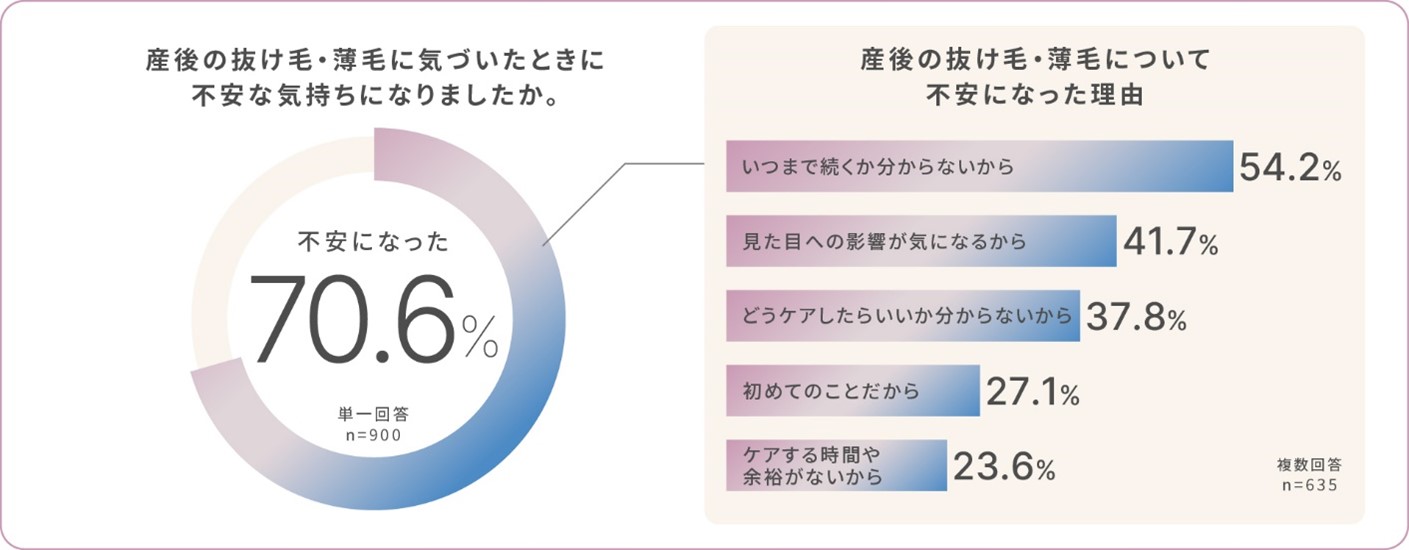
■One in four individuals experienced concerns about postpartum hair loss felt unable to discuss their worries with anyone.
When inquired about seeking advice for postpartum hair loss, one in four respondents (26.8%) either did not or consult with anyone or were unable to do so, showcasing the uncertainty about whom to approach and isolation felt regarding this issue.
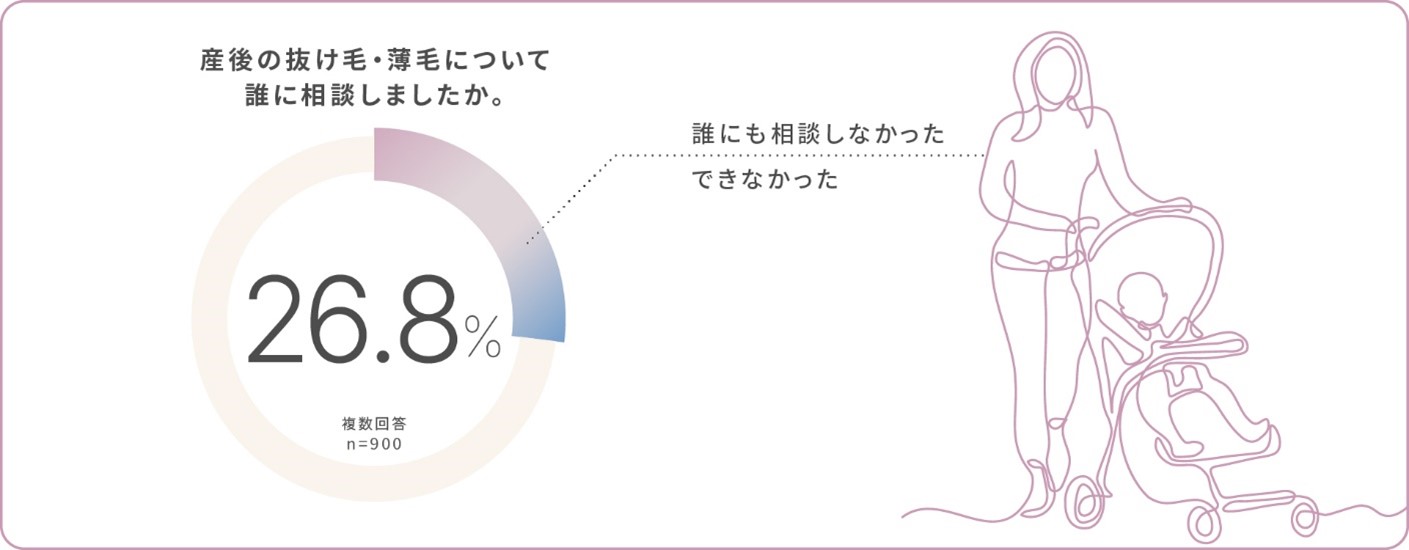
■The top awareness priority is the desire to know easy home care methods. Nearly 70% of respondents seek to understand from those around them regarding postpartum hair loss.
when individuals who have experienced postpartum hair loss and thinning hair were asked to reflect on their presepctives, top responses included: "I want to know how to easily care for it at home (73.1%)", "I want people to understand more about postpartum hair loss and thinning (66.4%)", "I want my spouse / partner to provide support to mothers suffering from postpartum hair loss and thinning (65.4%)". This underscores a rising demand for home-based solutions, particularly among those engaged in childcare responsibilities, and a prevalent need for understanding and assistance from their families and those around them.
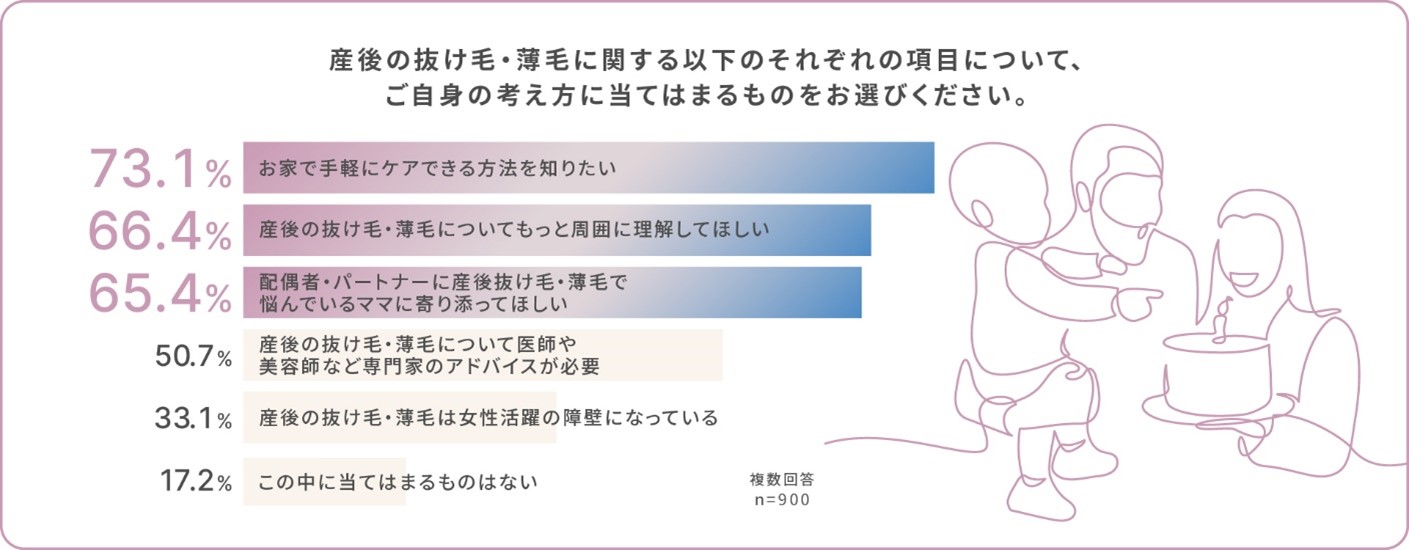
■More than half of the respondents had consulted with their families about the problem of postpartum hair loss. Is communication with your partner a stepping stone to resolving anxiety?
Over half (51.4%) of respondents indicated consulting their spouse or partner about postpartum hair loss. Among them, 83.8% received childcare support from their partner, with 41.5% of those reporting that their behavior changed due to postpartum hair loss and thinning hair was "not particularly good". This suggests that engaging in communication with family members tends to reduce the challenges associated with postpartum hair loss.
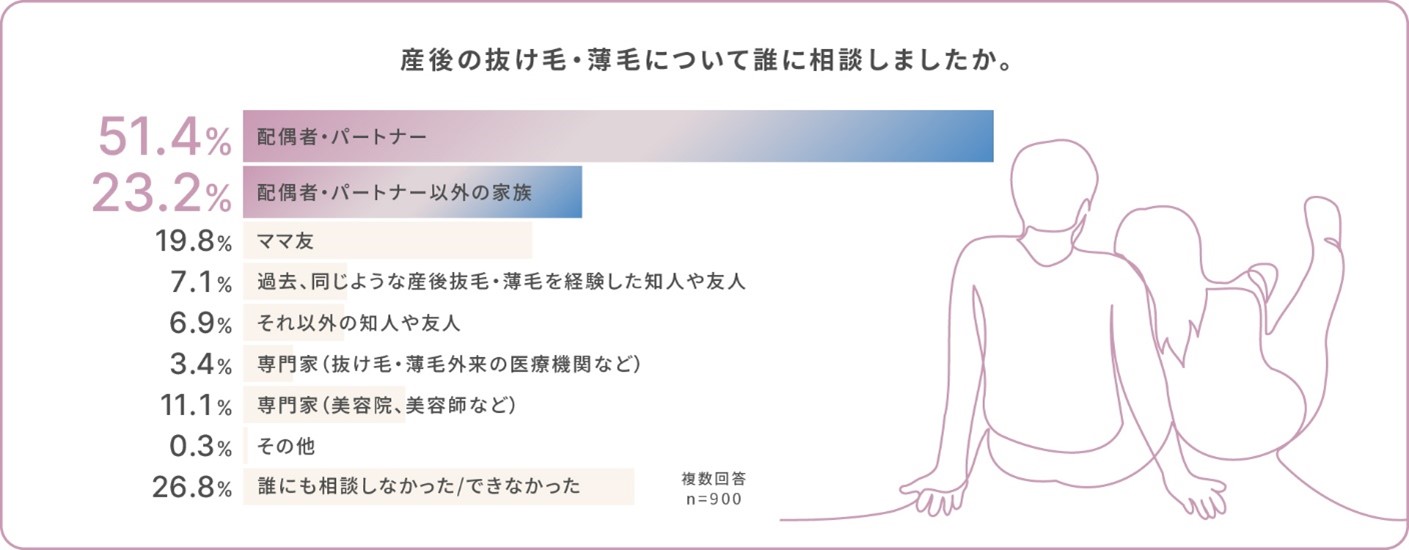
■People who are more motivated to return to society after maternity leave tend to think that postpartum hair loss is "a barrier to women's success."
Among postpartum mothers (30.9%) who wanted to return to society, nearly half (42.4%) answered that "postpartum hair loss is a barrier to women's success," suggesting that postpartum hair loss may affect motivation to return to society after maternity leave and decline in work performance.
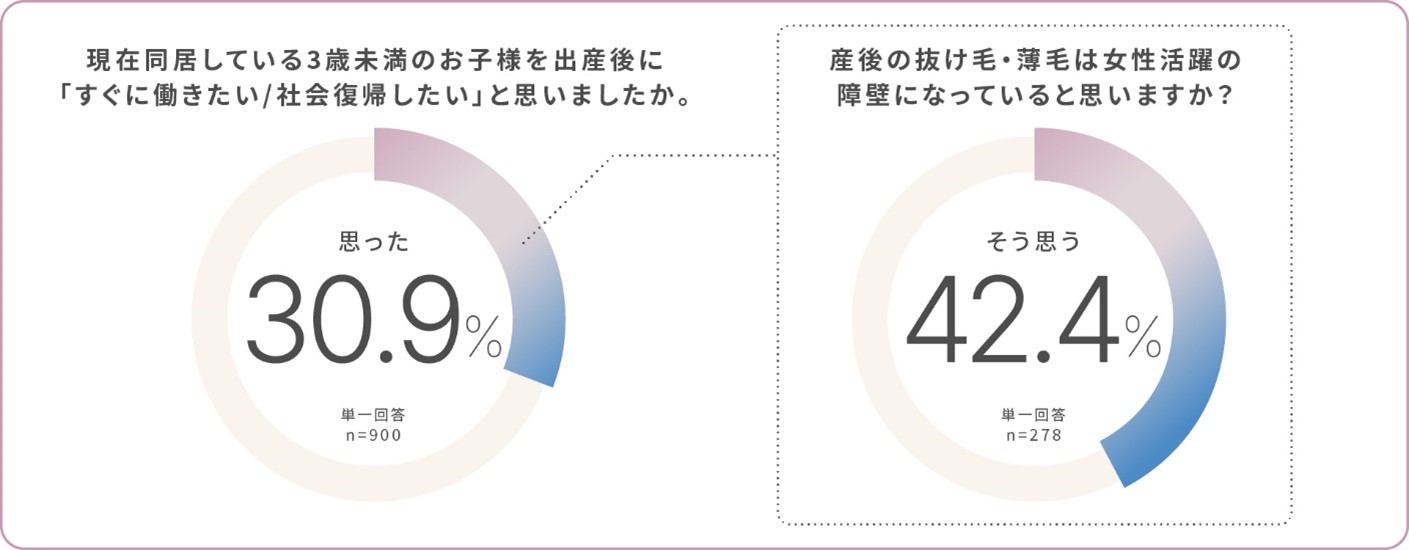
Comment from Dr. Hamanaka Satoko, President of Creage Aging Care Clinic
Postpartum hair loss is mainly caused by changes in hormonal balance and is also called "postpartum alopecia" or "postpartum alopecia". Postpartum hair loss, a phenomenon that typically begins a few months after childbirth, poses a challenge for many mothers. Amid the demanding responsibilities of childcare and housework at this time, many mothers neglect their self-care due to having "mental worries and anxieties" caused by postpartum hair loss. Conversely, patients who visit medical institutions and receive advice from doctors have reduced their psychological anxiety, with many of them leaving the clinic with a positive outlook. In this survey, it seems that many people expressed a desire to learn "simple home care methods." However, when used in conjunction with appropriate treatment at medical institutions, many individuals find themselves better equipped to confront postpartum hair loss with a more positive attitude.

For the first time, we've released a documentary video that showcases the hair loss challenges faced by postpartum mothers! From December 15th (Fri), the "Beauty salon to nurture moms' future" event will be held for a limited time.
Amid the hectic routine of childcare, postpartum moms often grapple with hair-related concerns in isolation, unable to share their experiences with others. We aspire to provide support so these mothers do not feel overwhelmed by themselves, enabling them to continue enjoying their work and life in a positive way, interacting with society. The "Beauty salon to nurture the future of moms" aims to address hair-related struggles faced by mothers leveraging the potential of ultrasound technology. In addition, a documentary video on hair loss care for postpartum mothers visiting beauty salons will be released today, November 30th (Thursday). Through interviews with postpartum mothers, we aim to bring the possibilities of ultrasonic care to the world.
◎ Documentary video URL:
◎ "Beauty salon to nurture mom's future" special site URL: https://sonorepro.com/careproject
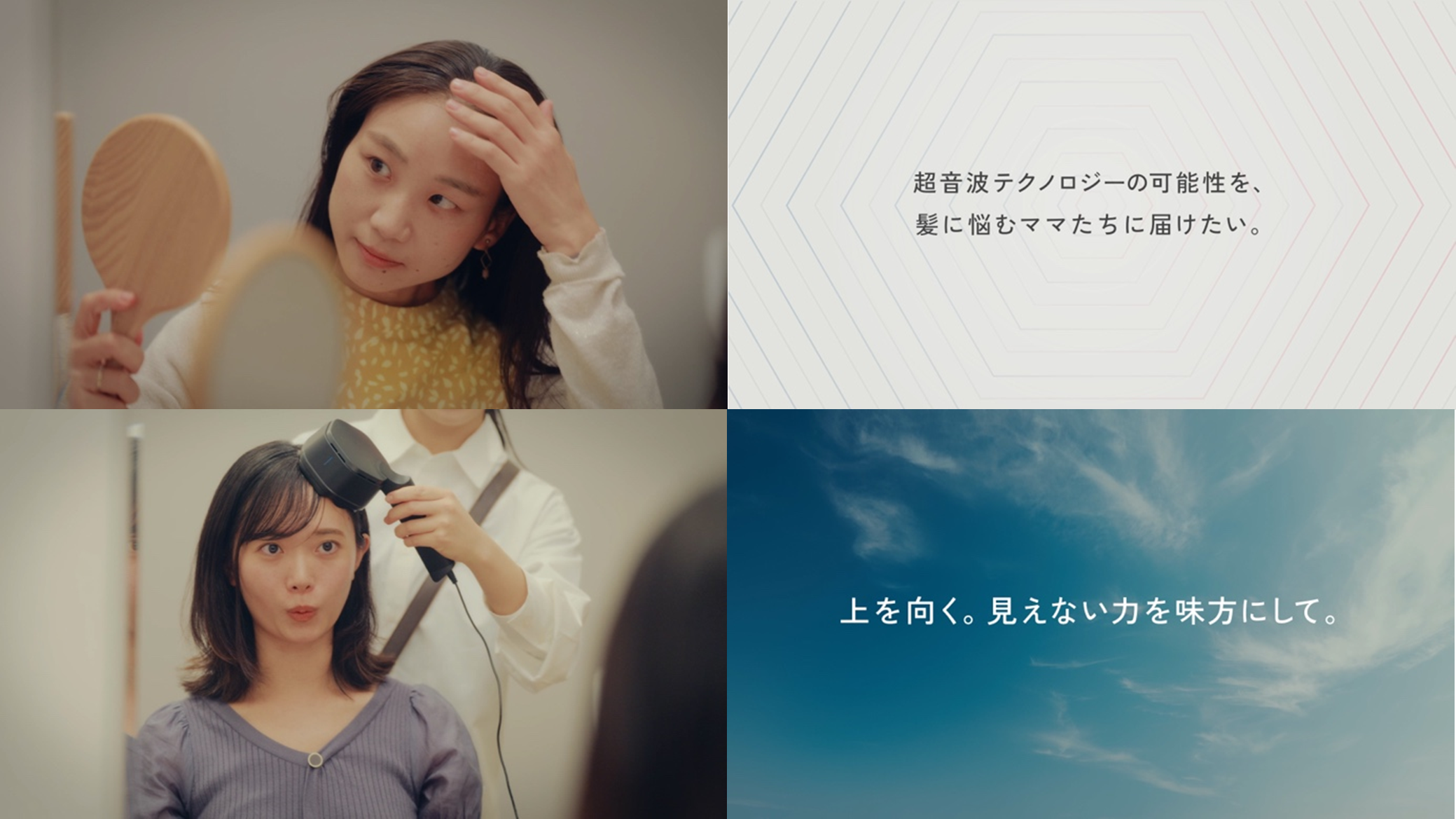
■Beauty salon to nurture mom's future
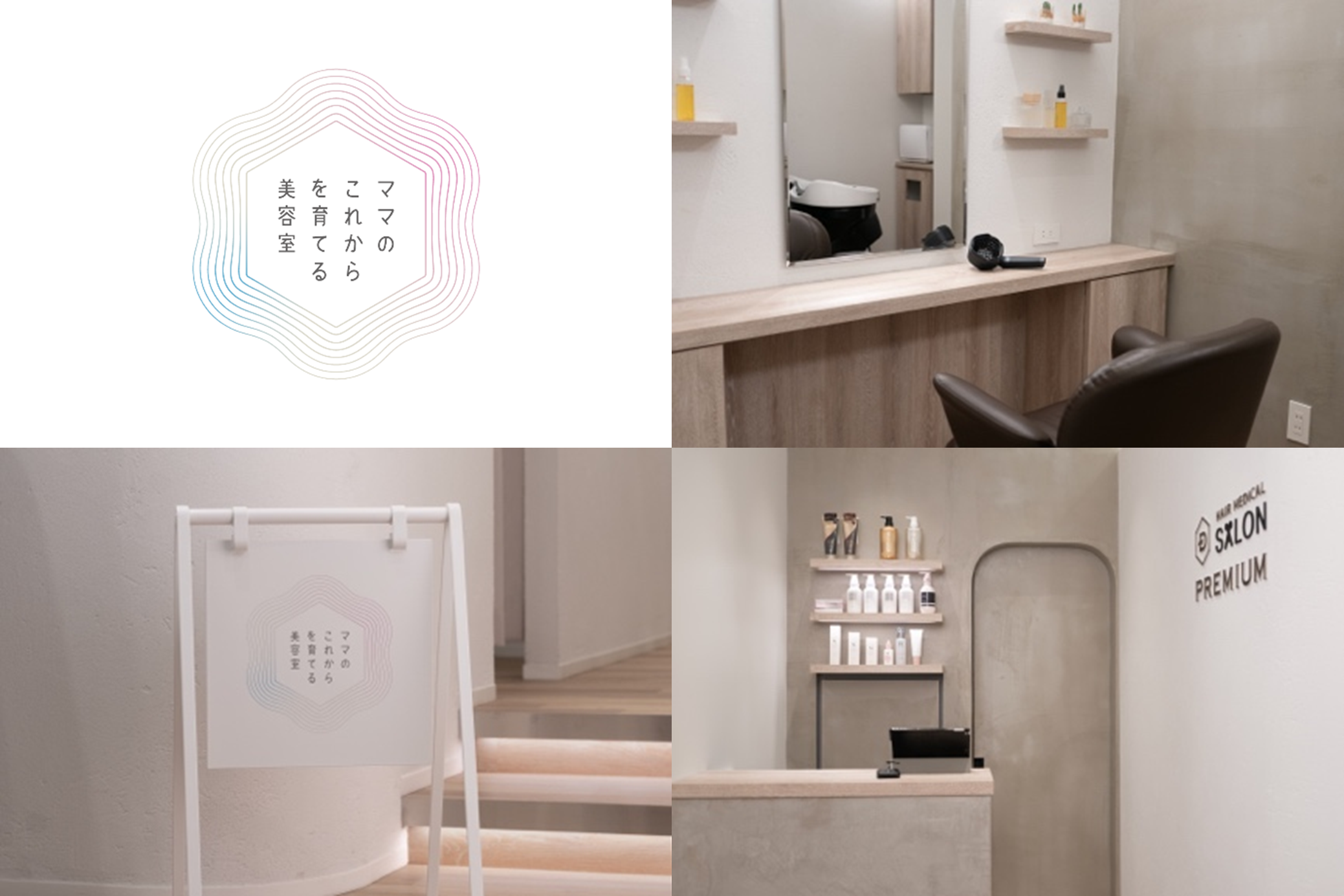
At the "Beauty Salon to Nurture Mom's Future," which is close to postpartum moms' hair problems, you can consult about various postpartum hair problems, including the experience of ultrasound care. Please feel free to contact us.
Program : 1) Experience SonoRepro, an ultrasonic scalp care device and serum set
2) Hair counseling by professional staff
※The program will be about 20 to 30 minutes in total.
※Cuts, shampoos, blows, etc. are not included in the program.
※The program will be an experience by the person who made the reservation.
※Please contact us for details.
Period : December 15 (Fri) - December 22 (Fri), 2023 (Closed on Sundays and Mondays)
Time : 11:00-, 13:00-, 15:00-, 17:00-
Location : 1-7-1 Yurakucho, Chiyoda-ku, Tokyo Yurakucho Electric Building South Building B1F
"Inside the hair medical salon Ginza PREMIUM store"
Fee : Free of charge
Reservations and inquiries : https://peatix.com/event/3771608/view
About SonoRepro
SonoRepro is an ultrasonic scalp care device jointly developed by combining the technology of Pixie Dust Technologies and the hair research of Annfer in preventive medicine. The "non-contact vibration pressure stimulator" introduced to the scalp / hair specialty D clinic has been miniaturized to realize full-scale hair care at home. It can also be used on a head coated with minoxidil, and modulates the amplitude of air vibrations of about 40,000 times/second, stimulating the scalp in a non-contact manner. With a compact design of about 260g, you can use it anywhere.
To use it, apply the device for 1 minute to each part of the scalp that you are concerned about (hairline, brush, etc.). You can use it regardless of gender.
◇SonoRepro brand site
URL: https://sonorepro.com
* SonoRepro and related logos are trademarks or registered trademarks of Pixie Dust Technologies, Inc..
Contact about this matter
Pixie Dust Technologies, Inc. PR team
https://pixiedusttech.com/contact/